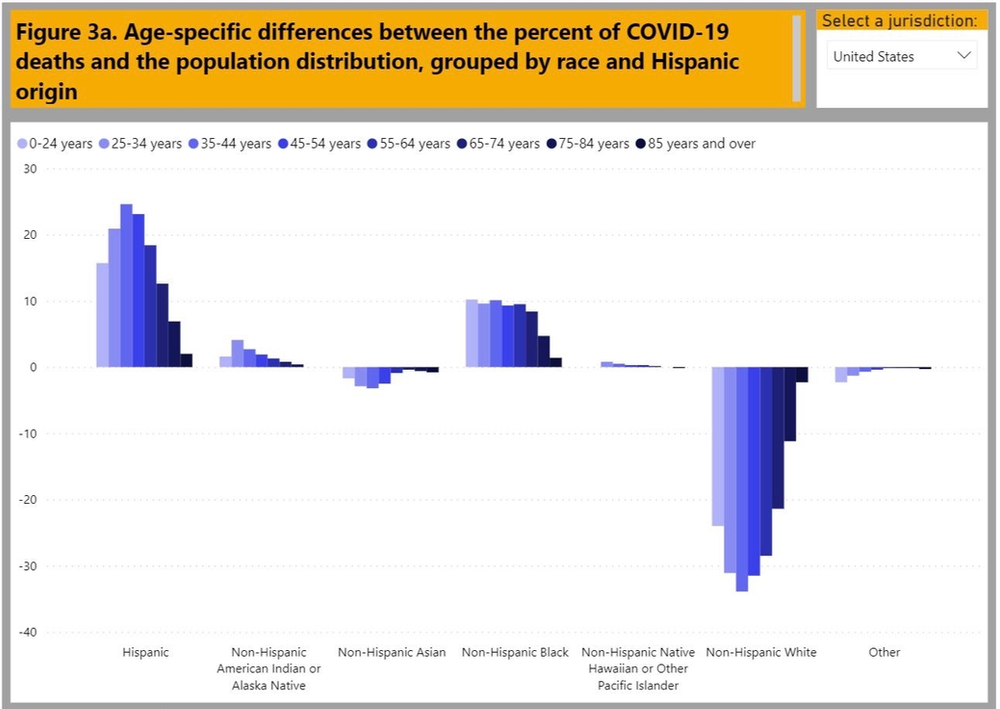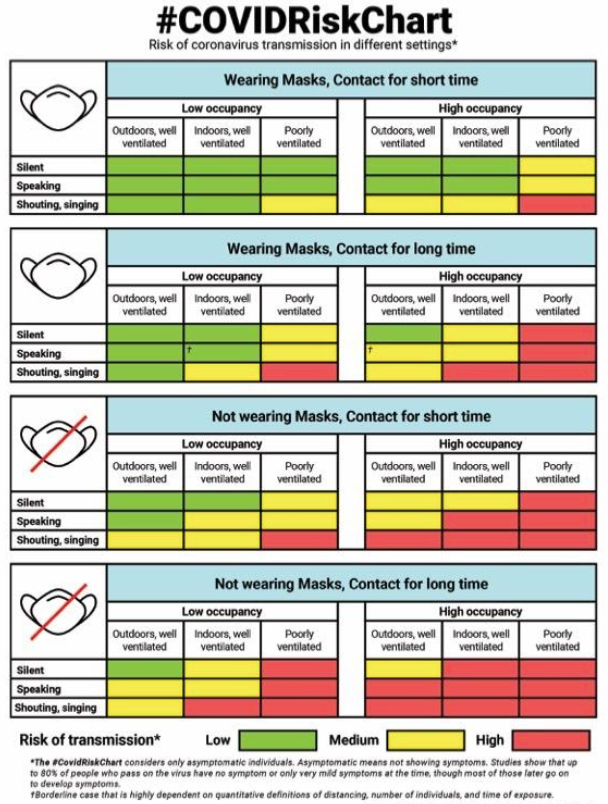Paloma speaks with Dr. Lupita Montoya, an indoor air quality expert, about COVID-19 health disparities, the importance of air circulation/ventilation, key takeaway lessons of the pandemic, and more.
The following is a transcript of the conversation, which has been edited for length and clarity. Listen to the full episode here.
[Paloma:] First I want to ask, how has the pandemic affected your own community?
[Dr. Montoya:] I am a Hispanic person, or a Latinx, or a Chicana, or a Mexican-American. The community that I belong to has been impacted in disproportionate ways during the pandemic. That includes cases of transmission, rates of deaths, economic fallout, and even disadvantages for our children in school; many of them are falling behind because of the inequities that we have in the educational system.
And if we, the Latinos, make up 18% of the population, then deaths by COVID should be 18% Latino. But that’s not what we’re finding.

And this is not just for the Latino community; it is also true for the Black community and the Native/ Indigenous communities in this country. These are the three demographics that have seen the most impact; they’re dying at much higher rates.
One of the things that I have focused my research on is indoor air quality issues in disadvantaged communities. So the people who are now being impacted have been, for a long time, the people that I have done my science with.
In the past, when I’ve looked at indoor air quality and how it affects people’s health, it may be compromising people’s health to the point that when something like coronavirus shows up, they are more susceptible to get sick. For example, one of the studies that I did was on indoor air quality in the Navajo Nation, and specifically the emissions from combustion burning, and how it can cause damage to our cells.
This damage can happen in many different systems [in the body]. It seems to be mediated through an inflammation state, which will make us probably more susceptible to things like coronavirus. When I did my study with the Navajo, that’s what I was looking for: is there something that is happening already? When the coronavirus arrived, it was clear to me that they were going to have very bad outcomes, based on the science I already knew.
The science is out there, but it’s not necessarily being leveraged to protect the people that are most susceptible. I’m hoping that we’ll do better in the future.
[Paloma:] As an indoor air expert, do you have any suggestions other than the CDC guidelines? Are there any other ways to protect yourself in your home or in your workplace?
[Dr. Montoya:] Yes. Even though it seems like this pandemic really is out of our hands, there’s quite a bit that we can do. We can minimize our exposure, whether it’s at home or at work, by paying attention to the air that we’re breathing. This is where I’ve spent decades, literally (studying the indoor air both in homes and at work).
So, you can have things like replenishing the air, and you can do it mechanically; for example, if you’re in a home that has central air, you can operate that, whether it’s an air conditioner or the heater; move that air out and replace it with clean air using the mechanical system. You can also do it if you have a portable filter. There are ways that you can create some of them, but certainly, you can buy some of these in the market.
If you don’t have access to that, then you open windows and doors for natural ventilation. The problem with indoor air is that if you have everything closed, and if you’re producing the coronavirus, those concentrations are going to continue to increase. For me, the coronavirus is nothing more than another pollutant that I have to deal with.
Exposure accounts for two main variables: 1) the concentration of the pollutant — in this case, the coronavirus — and 2) the time that you spend there. So if you go into a store, don’t linger there! Do your business, get your stuff, and leave.
[Paloma:] Is there anything you want to clear up, any misconceptions about COVID?
[Dr. Montoya:] One of the things that worries me is this idea that we don’t have any control. To some extent, we don’t in some places, but there are things that we can do. One of the first things that we really need to know, is to empower our community — especially those that are suffering the most — with knowledge. Help them feel that they can protect themselves.

Some of these things, like attending service… I go to Mass every Sunday, but I stay in my car. My church moved the mass to the parking lot in the summer, and they went back inside, but I didn’t. This is probably one of the most challenging things for communities, like the Latino community, where we are highly social and very family-oriented. So it’s difficult for people to stop.
But people are starting to do a little bit better. Because sometimes we may be fine even if we get COVID — we may be healthy enough that we can recover properly — but, we may be responsible for getting somebody else infected, who may not be healthy enough to deal with it, and may not make it.
That is something that we can work a little bit better with. Because we are loving people, we care about our families and our friends, and we need to go against our usual behaviors of wanting to be with those that we love — but, showing our love in a slightly different way now.
[Paloma:] Until we can reach mass vaccinations, it’s going to be a challenge. Do you have any concerns about vaccines and distribution?
[Dr. Montoya:] Oh, my goodness. This is a whole other beast, now, with vaccinations, because even the distribution is hitting all kinds of inequities. To speak of a few, at least in the state of Colorado… One of the first priorities was to deal with people who were in group living — places like prisons and jails. There was an uproar, in the public eye, through the newspapers: people were arguing that people in prisons should not be vaccinated before other people, because why are we protecting them?
Being a person of color, especially a Latina, and knowing who is in prison… It’s another unequal and unfair system where a lot of my people are trapped in. Many of them are there because of the high inequities in the criminal system. Now they’re in high danger, high risk of contracting COVID, and people didn’t want them vaccinated, even though they’re in one of the riskiest places, just because they happen to be in prison.
So I looked at this thing, and it really hurt my heart that people cannot have compassion — and in this case, it’s not even compassion; this is about science. The fact that we’re willing to do without science when it’s convenient because biases are more important than science — this is where we are in this country. That’s just one example.
The other thing is the logistics of distributing the vaccine are difficult. We don’t have a very good public health system. Even in my city, where they’re working very hard (our local government with the health agencies) to get people vaccinated, sometimes it’s difficult to get to some of the marginalized communities.
There are some conversations about how we can help people that, for example, cannot easily sign up using the internet. Now, some of the kids have it because of school, but some of the elders don’t know how to use computers. They don’t have a computer. Or if they call, they may not speak the language.
I’ve heard all kinds of stories about multiple members of a family — younger, usually — trying to help an elder person in their family get their vaccine. It’s not easy. My own mother in Los Angeles had to go through this, and eventually, she did get her first shot. And my mother is bilingual; not everybody is bilingual. It makes it harder if you don’t have even those resources.
And just to mention some of the discussions I have with the local people here in Boulder… People want to go and get vaccines, and they can get on a list, or if there is some extra in a pharmacy, but, these people do not have transportation, or they need translation services. That’s what we’re talking about now. Can we help these people somehow? We need to be dealing with this.
If some of us try to step in and do even a little bit, it will be helpful, while the government gets things in order, because we’re not really well-equipped to deal with something like this. And we came from even worse situations. At least, we’re starting to have more coordinated responses. I like to think that eventually, we’ll get things under control, but it certainly is a logistical nightmare.
[Paloma:] Is there anything that keeps you motivated while working on all these different things?
[Dr. Montoya:] Yes. The truth is, there’s a lot of good people around the country — a lot of young people and older people like myself — trying to do our part to move forward in positive ways so that we are better prepared in the future.
The main thing is, we have seen the damage our country has endured by not trusting scientists, and by not being equitable in the way we distribute resources, or the way that we protect or don’t protect people. At the end of the day, what we’ve seen is that all of these things translate into bad things for everyone.
I’m hopeful in that sense — that a lot of injustices have to come up to the surface for us to finally look at them in the face, and say, “This is not what we thought we had in this country. Let’s work towards what we really want.”
And there’s enough people doing that now, that we finally will get the America or the United States that we dreamed of, or that we claimed we had. I think our chances are better now than when we ignored all of these things. We can’t ignore them anymore — that’s the good news. We cannot ignore them, so, therefore, we got to get to work. We all need to put in our part and then we’ll really get to have the country we want. It all adds up.
I’m very hopeful about that.